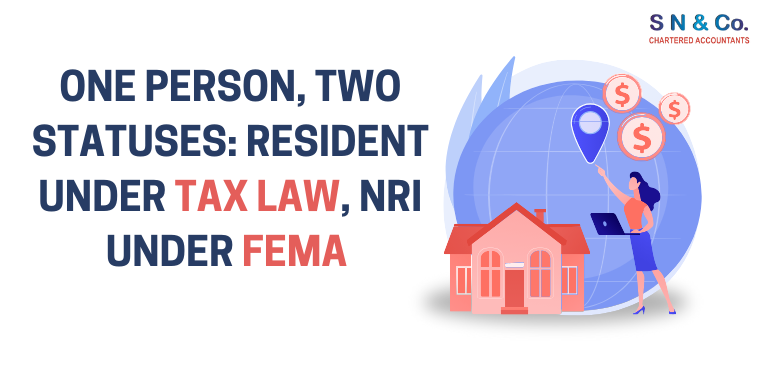If you are planning to move abroad for work or business, or if you are an NRI managing financial affairs in India, you might assume that once you leave India, you automatically qualify as a Non-Resident (NRI) under all Indian laws. But is that really the case?
The reality is that residency status is not the same under the Income Tax Act and FEMA (Foreign Exchange Management Act). You could be a Resident for tax purposes but a Non-Resident under FEMA at the same time!
This blog will break down these differences and explain how residential status is determined under both laws, using a real-life case study.

Who is a Non-Resident Indian (NRI) as per the Income Tax Act?
According to the Income Tax Act, 1961, an individual qualifies as an NRI if they do not satisfy the conditions for being a Resident.
An individual is considered a Resident in India if they meet any one of the following conditions:
| Individual Type | Residency Criteria | Resident | Resident but Not Ordinarily Resident (RNOR) |
| Any Individual | Stayed in India 182 days or more in the financial year OR Stayed 60 days + 365 days in the 4 preceding years | Resident | NR in 9 out of 10 preceding years OR Stayed ≤ 729 days in the 7 preceding years |
| Citizen of India (Leaving India) | Left India as ship crew member or for employment outside India | 182+ days in India in the 4 preceding years | NR in 9 out of 10 preceding years OR Stayed ≤ 729 days in the 7 preceding years |
| Citizen of India / Person of Indian Origin (PIO) | Visits India from abroad AND earns ₹15 lakh+ (excluding foreign income) | 182+365 days in the 4 preceding years OR 120+ 365 days in the 4 preceding years | 120-181 days stay qualifies as RNOR |
| Citizen of India | ₹15 lakh+ income (excluding foreign income) and NOT taxable in any other country | Always considered Resident | Always considered RNOR |
Key Takeaway:
Your residential status for tax purposes is based on the number of days you spend in India. However, does FEMA follow the same rules?

Is Residential Status the Same Under FEMA?
No. FEMA follows a different approach for determining residential status.
Section 2(v) of FEMA, 1999 defines a “Person Resident in India” as:
A person who has stayed in India for 182 days or more in the preceding financial year, except when they have left India for:
- Employment outside India
- Carrying on business or vocation outside India
- Any other purpose that indicates an intent to stay abroad indefinitely
Who is a “Person Resident Outside India” under FEMA?
Anyone who does not qualify as a Resident under FEMA is automatically considered a Non-Resident under FEMA.
Key Difference from Tax Laws:
- The Income Tax Act determines residency based on the number of days spent in India in the current year.
- FEMA focuses on intent—whether a person has permanently shifted abroad for work or business.
This difference can lead to a unique situation where a person is a Resident under the Income Tax Act but a Non-Resident under FEMA.

Can You Be a Resident for Tax Purposes but a Non-Resident Under FEMA?
Yes, and let’s see how through a case study.
Case Study: The Confusion of Mr. X
Scenario:
- Mr. X took up employment in the USA on January 1, 2023.
- Until then, he was living in India for 275 days in FY 2022-23.
- He continues to hold an executive directorship in an Indian company.
Key Question:
What will be Mr. X’s residential status for FY 2023-24 under both Income Tax Act and FEMA?
Answer:
As Per the Income Tax Act (Section 6(1))
- Mr. X has spent 275 days in India in the previous financial year.
- Since he was in India for more than 182 days, he qualifies as a Resident for tax purposes.
- Conclusion: Mr. X is a Resident under the Income Tax Act.
As Per FEMA (Section 2(v))
- Mr. X moved to the USA for employment, which qualifies as a valid reason to become a Non-Resident under FEMA.
- Since his intention is to stay abroad indefinitely, FEMA immediately classifies him as a Non-Resident from the date of departure.
- Conclusion: Mr. X is a Non-Resident under FEMA.
Final Verdict:
✔ Mr. X is a Resident for tax purposes but a Non-Resident under FEMA.

Why Does This Matter?
If you qualify as an NRI under FEMA, it affects:
- Banking Regulations:
- Must convert Resident Savings Account into NRO Account
- Can open NRE and FCNR Accounts
- Taxation of Global Income:
- If you are a Resident under Income Tax Act, global income is taxable in India
- If you are an NRI under FEMA, foreign assets are not regulated by FEMA
- Investments & Remittances:
- Non-Residents under FEMA can repatriate foreign earnings freely
- Residents under the Income Tax Act must report foreign assets in Indian tax returns

Key Takeaways
✔ Residency under the Income Tax Act is based on days spent in India, while FEMA considers intent.
✔ You can be a Resident for tax purposes but a Non-Resident under FEMA.
✔ Being a Resident under the Income Tax Act means your global income is taxable in India.
✔ NRIs under FEMA have different banking and investment regulations than tax Residents.
💡 Still confused about your residential status and tax obligations?
📩 Connect with us today for expert guidance and personalized tax advice.






